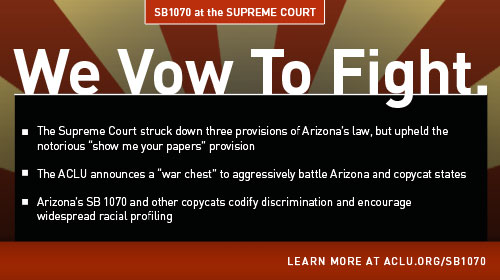
The highest court in the land has had its say. Politicians and media pundits have had their news cycle. And in Arizona, we’re back to where this all begins and ends—where the resolve of people across the state will again be tested in the coming weeks and months as the “show me your papers” provision of SB 1070 is implemented.
In Arizona, part of that resolve requires simply sorting out the facts. In their zeal to claim victory, . Inaccurate statements such as these are irresponsible and muddy the already dark waters. Yesterday, civil rights organizations, including the ACLU of Arizona, sent a letter to the attorneys representing Gov. Brewer and other defendants in the Friendly House v Whiting case, explaining that the court order forbidding implementation of SB 1070's racial profiling provision, Section 2(B), remains in place unless and until it is modified by a further order from a federal court. Until that time, no law enforcement agency in Arizona should implement Section 2(B).
In the meantime, on the ground, we’ve only just begun. As the Court foreshadowed, many legal questions about Section 2(B) remain to be resolved. Together with a coalition of civil rights groups, the ACLU is moving forward in Friendly House v Whiting, our legal challenge that raises the exact claims left open by the Supreme Court – including claims that SB 1070 is discriminatory, will lead to racial profiling, and invites the unlawful arrest and detention of people of color, including many born in this country. Several of the plaintiffs in our case have already faced racial profiling and unlawful arrest by local police, or are afraid that they will be discriminated against because of the color of their skin.
VIDEO: Know Your Rights: Supreme Court Rules on Arizona Immigration Law
Please note that by playing this clip You Tube and Google will place a long-term cookie on your computer. Please see on their website and on theirs to learn more. To view the ACLU's privacy statement, click here.
If we learned anything in 2010 when SB 1070 was first signed into law, it’s that the people of this state are resilient. They will not back down, because for them, the stakes are too high. For the past three days we’ve staffed a community hotline together with local organizations and individual volunteers who have stepped up to answer calls from concerned community members. We’ve received close to 400 calls so far, with the majority of people asking for accurate information about the decision and the law, and for referrals to immigration attorneys and family law attorneys. Many of the callers have been mothers who are fearful of arrest or detention, and are looking for help in planning for their U.S. citizen children’s care.
We’re hosting community forums and workshops throughout the state and have released PSAs in English and Spanish informing people about the decision and their basic, constitutional rights. An all too common misconception is that undocumented immigrants do not have rights in this country. But in fact, the fundamental protections of our Constitution cover all people living in the United States, regardless of immigration status. We expect that in the months ahead, the number of calls will increase and the need for information will turn into a need for legal assistance and representation. We’ll be here to answer that call.
VIDEO: Conozca Sus Derechos: SB1070 Y El Tribunal Supremo
Please note that by playing this clip You Tube and Google will place a long-term cookie on your computer. Please see on their website and on theirs to learn more. To view the ACLU's privacy statement, click here.
If the civil rights battles in our country’s past have taught us anything, it’s that the long road ahead will be paved with courageous people who stand up for basic American values, fight against unfair and discriminatory laws like SB 1070 and come out on the right side of history.
Learn more about immigrants' rights: Sign up for breaking news alerts, , and .

